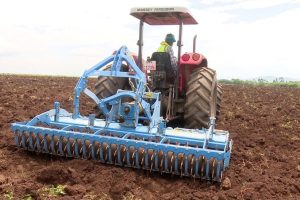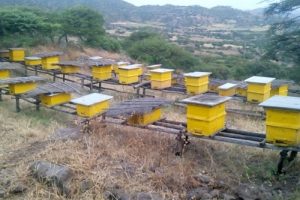
In many developing countries like Ethiopia, there is a growing concern that with increased globalization and emergence of expanded lucrative markets, smallholder farmers could be marginalized from emerging market opportunities and market information. Contract farming has been widely recognized by policymakers as a strategic option with the potential to link smallholder farmers to emerging market opportunities.
Most recently Ethiopia has established a legal framework in July 2023, known as the Agricultural Production Contract Proclamation No. 1289/2023, which aimed at regulating agricultural production contracts. This legislative milestone comes as a response to existing legislation which lacked comprehensive coverage of agricultural contracts. The proclamation is designed to specifically govern agreements between contractors and producers in the context of supplying agricultural produce.
This new legal framework specifically deals with agreements made between contractors and producers in the context of supplying agricultural produce. The proclamation also provides a prospect to both parties to renegotiate on price when price escalation occur at time of agricultural product delivery above or below the price indicated on agricultural production contract considering equity and long-term relationships.
One of the biggest obstacles to the success of a contract farming scheme is that the small farmers will fail to honor the contract by selling the contracted crop to a third party, a practice known as side-selling. A critical problem is when smallholder farmers sell part of their crop to alternative buyers, rather than the contracting company. This is an issue for companies as they may have invested in inputs and training, yet do not receive the benefit of increased supply and may find it difficult to recoup the costs of inputs provided on credit from the smallholder farmers. As a result, when farmers fail to live up to the terms of the agreement, the contractual arrangement breaks down.
At a minimum, this behavior decreases the overall efficiency of the arrangements. In extreme cases side-selling may drive the buyer firm to exit the market, causing a loss to contractor and the participating farmers. Avoiding side-selling requires an understanding of the incentives of the small farmers who engage in it and the creation of an enabling environment that reduces the risk that farmers will resort to this behavior.
Many studies reveal that Farmers engage in side-selling for a variety of reasons. Some of these motivations are purely economic, such as an opportunistic sale to another buyer at a higher price, knowing that a weak judicial system gives the buyer firm little recourse to enforce the contract. For smallholder farmers, who frequently operate in a very risky environment with slim margins and few assets, selling agricultural produce in a spot market when liquidity is needed may make very real economic sense.
Indeed, side-selling is the opposite of monopsony power. In cases where there is a local market for the crop produced under contract, it is not uncommon for the contracted price to be lower than the local market price at the time of the harvest. In such cases, it might be tempting for growers to sell some of the contracted crops on claiming this as a loss. Whereas the exercise of monopsony power is an opportunistic behaviour on part of the processor, side selling is what refers to as leakage, which is an opportunistic behaviour on the part of the growers.
On the other hand, the biggest obstacle facing the survival of contract farming on crop which has little local demand is still side-trading.
However, smallholders may also lack the sophistication to adhere to contract terms. They may have little experience with formal contracts, low literacy and technical expertise, and may lack requisite knowledge of grades and standards. Side-selling may also occur due to a lack of trust between the parties, a failure to effectively communicate the terms and conditions of the contract, or due to other extraneous circumstances that prevent the farmer from living up to his or her side of the bargain. Faced with these risks, contractor or by person who has investment and trade licence or rent farm to enter into contract farming often prefer the sophistication and reduced monitoring costs by working with medium farmers.
Side selling seems to be economically unsound but it remains to be a rational decision from a small-scale farmer’s livelihood perspective. However, side selling has remained to be the main challenge in contract farming arrangements as it breaches the trust of the two actors, increases the buyer’s transaction costs and terminates the agreement. Some works of literature have tackled side selling but did not take into account of important policy variables such as neighbourhood effect, extension contacts, level of bargaining power and network externalities alongside trust, credit provision, higher prices, off-farm income, delayed payment and experience in horticulture production.
Despite much emphasis has been made on agricultural production contract or contract farming production arrangement, in developing countries especially in Africa, concerns and frustration on free rider problem are on rise across agriculture landscape in context to side-selling. This problem is brought by incomplete arrangements and institutional let-downs since the legal institutions are not functioning properly especially in developing countries, the traditions and customs of economic forecasts that investment and exchange flop as there is a fear of breaching and holdups.
Even if courts were to be present, legal action could not be taken in the breaching of agreements in agriculture as they will be restricted by the transaction costs. This has forced most of the agricultural aggregators to use third parties who are private or use informal mechanisms such as repeated dealings and reputation to improve the mutual trust among the actors during ex-ante and also resolve disputes in ex-post.
So far, that much emphasis has not been given on the trustbuilding between producers and buyers, their bargaining power and monitoring of farm enterprise in order to reduce the side selling behaviors of the farm enterprise owners. Trust encourages long-term relationships with the partners reducing side selling effect. This trust can be achieved through ensuring information flow between the buyers by developing advanced information sharing systems and also incorporating them in decision-making. For bargaining power, farm owners should be integrated in setting the prices and quality which might sensitize small-scale producers to comply with the contract terms reducing the leaking to alternative markets. Frequent monitoring is encouraged to create good relationship with the producers reducing side selling.
Farmers defaulting on part or their full contract by side selling to other buyers (often to avoid repaying input loans or when they have an immediate need for cash) results in significant losses for companies. Designing and enforcing contracts that effectively control for side selling is inherently challenging when working within weak developing country legal frameworks and with poor, remote smallholder farmers. Companies often bear a disproportionate amount of risk, but have little legal recourse if and when farmers default on their contracts. Smallholders, on the other hand, typically have limited cash flow, and therefore may have few options outside of defaulting in the face of emergencies or lower than expected production volumes.
In Ethiopia Agro- industry development landscape free rider problem is a crucial factor that affects contract enforcement. According to recent study, malt barley value-chain development study (2020), contract providers often incur additional costs to ensure quality production of the required volume of malt barley, which has a direct effect on pricing. These costs are associated with the provision of training, supervision, and providing access to inputs. However, those actors not engaged in such investments can manipulate farmers through a minor price margin incentive. In addition, the proximity of market actors such as local assemblers and traders creates an opportunity to manipulate market information that can influence marketing decisions, which encourages farmers to engage in side selling.
Indeed, contract farming is not without its critics. Agricultural production contractual arrangement involves natural expansion and contraction as market prices and consumer demand fluctuate. When coupled with farmer side-selling and other environmental challenges, smallholder-based contracting schemes have a turnover and significant failure rate. In some part of Africa like Ghana, poor relations between buyers and sellers resulted in more than 50 percent of all pineapple contract growers leaving the arrangement within 12 years. Studies in Kenya and Senegal have also shown a decline in the use of smallholders in favor of larger farms and production estates over time.
These statistics have led critics to question whether the short-term welfare gains from participation in contract farming schemes translate into long-term benefits for the smallholders involved, especially if the farmer must take on debt to invest in new technology in order to join the scheme. Critics also argue that contract farming exploits the free family labor employed by smallholders in these schemes, particularly the unpaid labor of women and children. Others have raised concerns that contract farming encourages (or indeed requires) monocrop.
The policy implication of this situation is clear. Establishing legal framework alone would not be sufficient to resolve the critical small holder and private sector problems. Whether contract farming is an appropriate business model depends on the structure of the market, the capabilities of implementing institutions, the level of small holder skill, incentives, behaviors, social tradition and the practical logistics setting of agriculture. Contract farming makes sense where the product has a limited and specific output market that requires a substantial upfront investment on road, storage, grading room, satellite collection center where the buyer seeks a particular quality and quantity that the market would otherwise not provide.
This intern requires broad-based organizational structure that seeks to address the existing vacuum of market and behavioral research, contract administration, functional market linkage, and supporting judicial and alternative dispute resolution in our contract farming platform.
BY MEKONNEN SOLOMON
THE ETHIOPIAN HERALD TUESDAY 5 DECEMBER 2023





